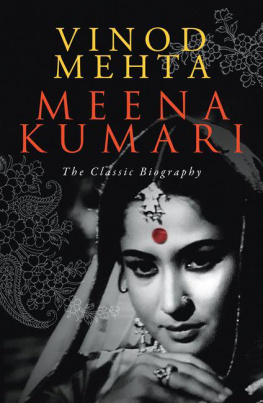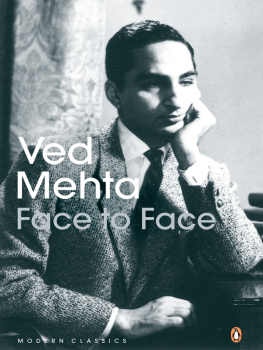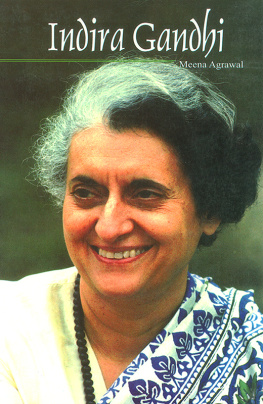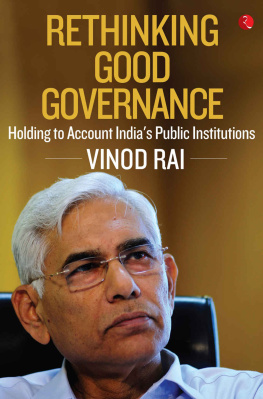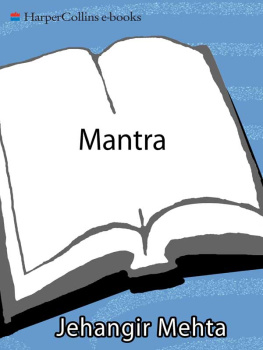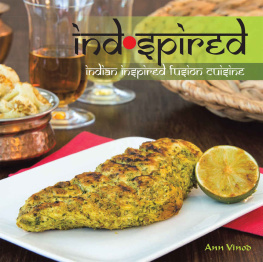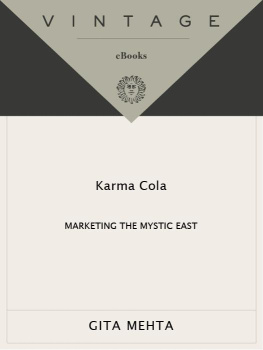MEENA KUMARI
Vinod Mehta
Downloaded from GAPPAA.ORG

HarperCollins Publishers India
To Meena Kumari wish I had known you
Downloaded from GAPPAA.ORG
Nobody is perfect.
Last line in Billy Wilders Some Like it Hot
Downloaded from GAPPAA.ORG
Contents
Downloaded from GAPPAA.ORG
Acknowledgements to the
Original Edition
Downloaded from GAPPAA.ORG
He would be a brave, possibly foolish man who would write a book on Meena Kumari without the necessary escape clause. For myself, at every stage in the writing I found that it was impossible to collect even one undisputed fact about this woman. Everything connected with her life had at least four versions. So I am sure lots of people will find enough material in this biography to complain, No, no, hes got it all wrong. It is not pineapple juice she liked but orange juice. I have no defence against such complaints.
However, I am greatly beholden to the many people who made this book possible. To most of them I was a complete strangerand film people are not over-renowned for welcoming strangers. Nevertheless, I was frequently made welcome and my queries were amplified and answered with patience and courtesy.
From among those who aided me, I would like to single out Mr Devi Dutt (Guru Dutts youngest brother) who was of immense help. Arun Varma is the other person I would publicly like to thank.
Also deserving my thanks are those who supplied the photographs that illustrate this book. Mr Ramesh Madholkar, Mr Shiraj Chawda, Mr A.L. Syed and others who prefer to remain anonymous.
Finally, I must say thank you to my publishers. They accepted, without inserting a comma, my way of doing this book and gave me the sort of editorial freedom I frankly did not expect.
Vinod Mehta
Downloaded from GAPPAA.ORG
Meena Kumari died of cirrhosis of the liver (precipitated by excessive drinking) in March 1972. I was still working as a copywriter in an advertising agency, and going nowhere. With the false bravado which comes easily to a person who has achieved little, I accepted the commission from Jaico and duly delivered the finished manuscript in October 1972. The biography, published in paperback and priced Rs 5, appeared a couple of weeks later.
Meenas husbands magnum opusPakeezahfourteen years in the making and vulnerable to the turbulence of their rocky marriage, had hit the screen in February 1972. Pakeezah opened at Maratha Mandir in Mumbai to a distinctly lukewarm response at the box office and from critics. Immediately after her death, however, a box office miracle occurred. You couldnt get tickets. The film became a roaring hit. Wild rumours abuzz at the time hinted that Kamal Amrohi had arranged the timing of her widely anticipated demise in order to rescue his tottering film. Homage to the famously tortured star was doubtless the prime reason for the films reversal in fortunes.
I got a few good reviews, particularly from K.A. Abbas in Blitz, but I have to admit I was slightly embarrassed with my effort. Besides the subject of the biography being unavailable, I was ditched by the man who callously used and discarded her, Dharmendra. He gave me many appointments, none of which he kept. Somebody familiar with the film world said to me as a complaint, How can you write a biography of Meena Kumari without talking to Dharmendra? True. Mr D was the love of her life. His absence from my script constituted a big void.
One other reason for my discomfiture. Because I was new at the writing game, I had few original or interesting ideas. The ones I did have were stolen, mostly from Mr Norman Mailer, who had not yet produced his tribute to Marilyn Monroe. Mailers Pulitzer Prizewinning The Armies of the Night was all the rage in the early 1970s. In a sense he created a new journalistic genre, which allowed the author to place himself at the core of his narrative. It was a highly personalized rendering in which the word I appears rather too often, while objectivity pops up rather too rarely. It still remained journalism but heavily author-centric. I lapped it up. At that formative stage of my writing career, my susceptibility to trendy literary movements and the fancy mode of expression of Anglo-Saxon writers should come as no surprise.
Although I have been an editor for nearly four decades, as a consequence of which my job almost on a daily basis involves grading manuscripts, I am a very poor judge of my own work. I need someone whose opinion I value to tell me whether I have written bullshit or a masterpiece. The feedback I got on my portrait of Meena Kumari went thus: I had produced an over-sentimental, maudlin life story compromised by the gratuitous insertion of my own personality into the narrative. A cooler, detached view would have improved the biography immeasurably.
For the past ten years, more than one publisher has approached me with the offer of reissuing the book, with perhaps a fresh introduction. I have resisted the offers since I was not sure my biography merited the honour. Truth to tell, I had forgotten I had ever written such a book. More pressing matterslike learning the nuts and bolts of editorshipengaged me. Indeed, I did not even possess a copy of the book, neither did I know or care whether there had been a second print. The biography was part of my mediocre past.
After my memoir Lucknow Boy appeared, for the first time in nearly forty years I reread what I had written in 1972. All the solecisms and structural weaknesses were cringingly visible, buthow can I put this?it was not as bad as I had thought. My self-created proximity to the subject posed an obvious and clear danger. Nevertheless, despite the naivety and exhibitionism and hurried judgements, I thought I had managed to capture some fleeting essence of the controversial actress. Was I being overgenerous to my own work? Perhaps. However, you must remember that in 1972 biographies of film stars were few and far between and those which existed were hagiographies. At least, I was able to puncture a few myths regarding the great tragedienne. Most of Meena Kumaris multiple woes were self-inflicted as she convinced herself she was unfairly exploited and betrayed by her lovers and lady luck.
The great tragedienne, as the media called her, began to subscribe to her on-screen persona; it merged faultlessly with her unhappy real life. She fell for the oldest trick in the world. Meena considered herself to be uniquely cursed. And copious consumption of brandy provided the only relief. It is a delusion which many people, not just film stars, carry. Not surprisingly, without knowing much about her, she empathized greatly with Marilyn Monroe. The fact that Marilyns husband, Arthur Miller, had some passing similarities to Kamal Amrohi, made the identification closer.
Mahajabeen Bano (Meena Kumari), Fatima Rashid (Nargis) and Mumtaz Jahan (Madhubala) were contemporaries. While competition and rivalry must have existed between them, there is nothing to suggest the Katrina KaifKareena Kapoor kind of petty bickering. When I spoke to Nargis, the actress was enjoying a fried egg on toast (she did not even offer me a glass of water!). She was entirely respectful and complimentary of her deceased contemporary.
How are Madhubala, Nargis and Meena Kumari remembered?
Nargis took early retirement after her marriage to Sunil Dutt, produced three children and became a social worker promoting safe causes. In 1980, she was nominated to the Rajya Sabha, where she took on Satyajit Ray. She accused the great auteur of giving India a negative image by pandering to Western sensibilities. Nargis mounted a ferocious campaign to ban Satyajit Rays films from being shown overseas, especially at film festivals. No one, including Ray, took much notice of her reactionary rantings. The lasting image of Nargis in the minds of most people is of the actress carrying an enormous wooden plough on her shoulders in
Next page
